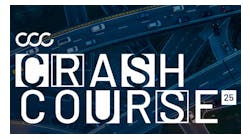Auto industry data access agreement discussed in Capitol Hill hearing
The U.S. House of Representatives Committee on Energy & Commerce Subcommittee on Innovation, Data and Commerce held a hearing on September 27 that examined over a dozen legislative proposals. One of those bills was the REPAIR Act. Scott Benavidez, AMAM, the board of directors chairman for the Automotive Service Association (ASA), testified at the hearing. In addition, Kathleen Callahan testified for the Auto Care Association (ACA).
Benavidez, owner of Mr. B’s Paint & Body Shop in Albuquerque, New Mexico, used his opening statement to educate the committee on the industry agreement ASA and the Society for Collision Repair Specialists (SCRS) reached with the Alliance for Automotive Innovation (Alliance). He explained that the agreement “ensures independent repair shops can diagnose and repair their customers’ vehicles without hinderance from telematics or any other innovation,” by stipulating, “independent repair shops shall continue to have access to the same diagnostic and repair information that auto manufacturers make available to authorized dealer networks.” Additionally, the agreement establishes a Vehicle Data Access Panel “to identify issues a party may have with respect to access as pledged in the agreement,” noted Benavidez. It also establishes a Data Access Working Group to confront broader policy questions posed by advancements that may alter the vehicle repair marketplace. Most importantly, Benavidez emphasized that “the agreement safeguards a competitive repair market that yields the fairest prices for drivers and the highest quality safety outcomes.”
Skepticism from members of the committee on the need for the REPAIR Act emerged from the hearing’s outset. In his opening statement, Subcommittee Chairman Bilirakis (R-Florida) devoted his attention to priority bills pertaining to fair ticketing practices, pool safety, transparent labeling, and made-in-America laws. Notably absent from his remarks was explicit acknowledgement of the REPAIR Act. However, he may have referred to the legislation implicitly when he stated, “Some of these proposals are surely ready for primetime, while others are not.”
Direct criticisms of the bill soon followed. After praising the industry pact, Representative Larry Bucshon (R-Indiana) quoted one of several provisions in the bill that would open access to data “regardless of whether those types of data are related to motor vehicle repair.” Benavidez’s answers to his questions reinforced his conviction that “data specifically related to repair is important, but other extraneous data that could be under the purview of the FTC under the current language in the law doesn’t sound like it’s the right thing to do.”
Other Republican members on the committee expressed reservations with the legislation. Representatives Rick Allen (R-Georgia) emphasized that he “doesn’t want to see any corporation gain unnecessary access to car data that can be used to bother my constituents with even more intrusive advertisements.” Then, Diana Harshbarger (R-Tennessee) concurred, “I think there are fair concerns that have been shared regarding the REPAIR Act.” Troy Balderson (R-OH) questioned if the bill is meant primarily to benefit importers of aftermarket parts, not vehicle owners.
Democratic members of the committee expressed support for ASA’ position and concern about legislation. Representative Debbie Dingell (D-Michigan) agreed with Benavidez that a robust and competitive repair market already exists, and she provided him an opportunity to detail how the new agreement with the Alliance solidifies independent repairers’ ability to compete with dealership-operated repair facilities in the future. Representative Dingell also raised the alarm that this legislation could expose independent repairers to cybersecurity dangers. Most independent repairers are small businesses that cannot afford costly cybersecurity protection systems. This predicament could make independent repairers unnecessarily vulnerable to legal liabilities.
In his testimony, Benavidez highlighted ASA’s longstanding support for the principles of right to repair and data access and the agreement’s nearing-universal vehicle coverage. He explained that the Alliance’s membership manufacturers 98 percent of the new vehicles sold in the United States. Tesla and Rivian adding their support further narrows the gap to 100 percent. He also drew a contrast between ASA – whose board is comprised solely of independent collision and mechanical auto repair facility owners and operators – and other aftermarket organizations that are not governed by independent automotive repair shop owners or do not include a single independent automotive repair shop on their board of directors. However, the moments that most strikingly illuminated where the interests of independent repairers truly lie came from the testimony of Ms. Callahan. In response to questioning from Rep. Allen, Callahan – a repair shop owner herself – stated, “Like Mr. Benavidez said, I just want the repair and maintenance data. I don’t want to know how often you go to Starbucks, or Dunkin…I just want to be able to professionally and safely fix cars.” Later, during questioning from Representative Lori Trahan (D-Massachusetts), Callahan reiterated, “We need repair and maintenance data. All the rest of the information that your vehicle is collecting, we don’t need access to. Mr. Benavidez and I do not differ in anything except for making this codified.”
Chairman Bilirakis said during the hearing that he will not move bills forward that are not supported by a broad consensus. The takeaway: Congress intends to give independent repairers and automakers time to implement their agreement.





